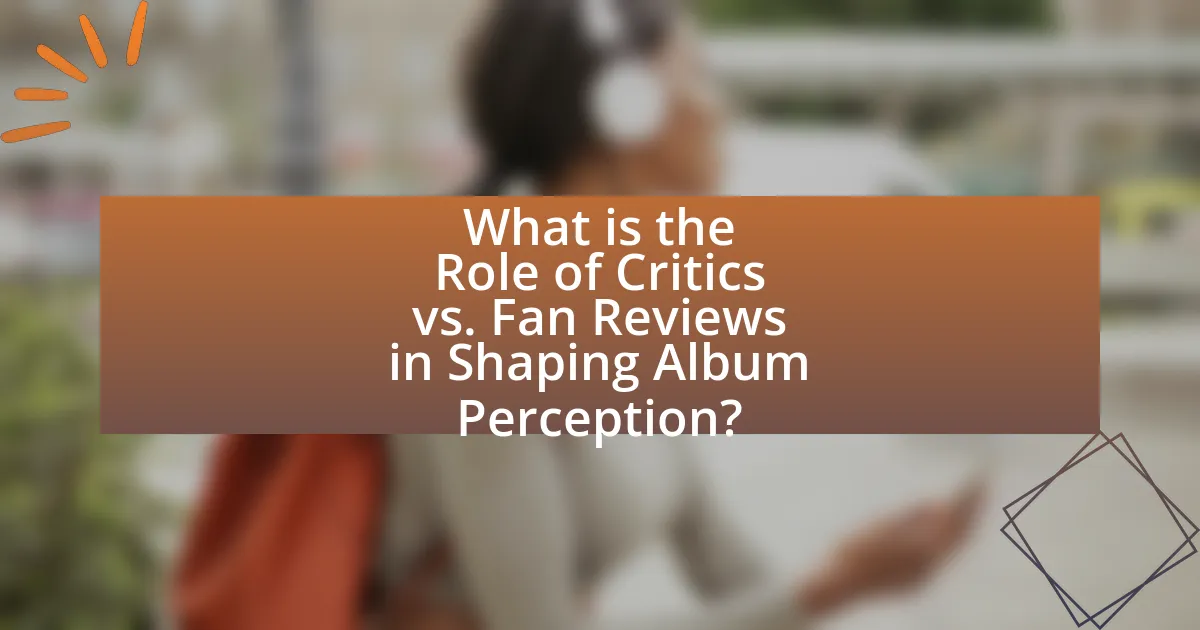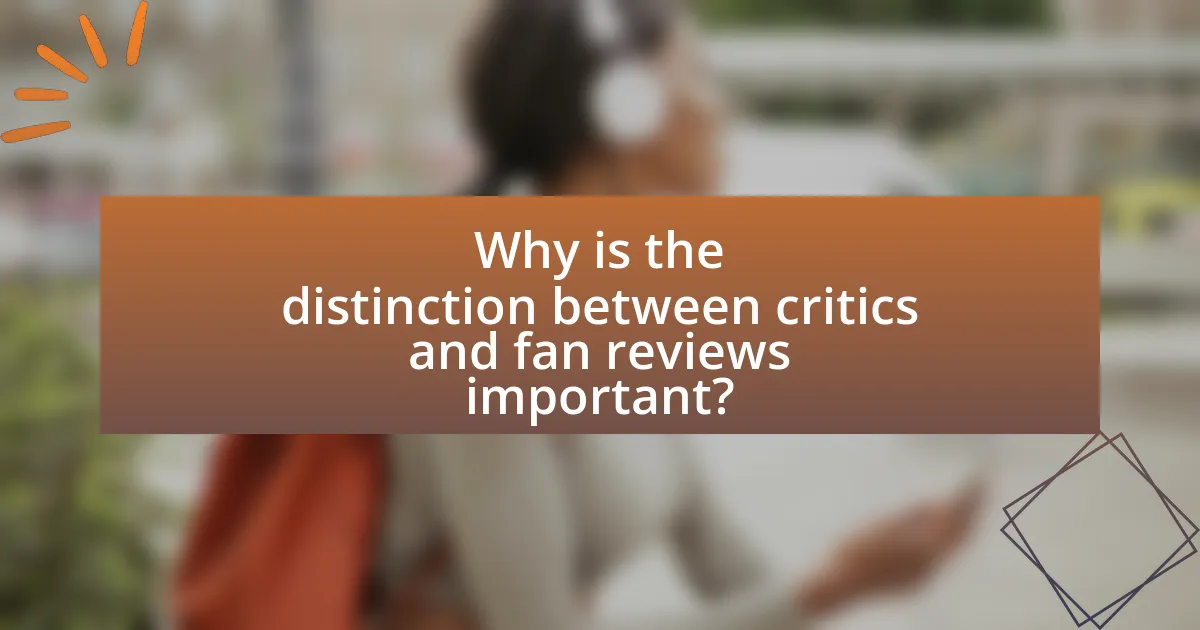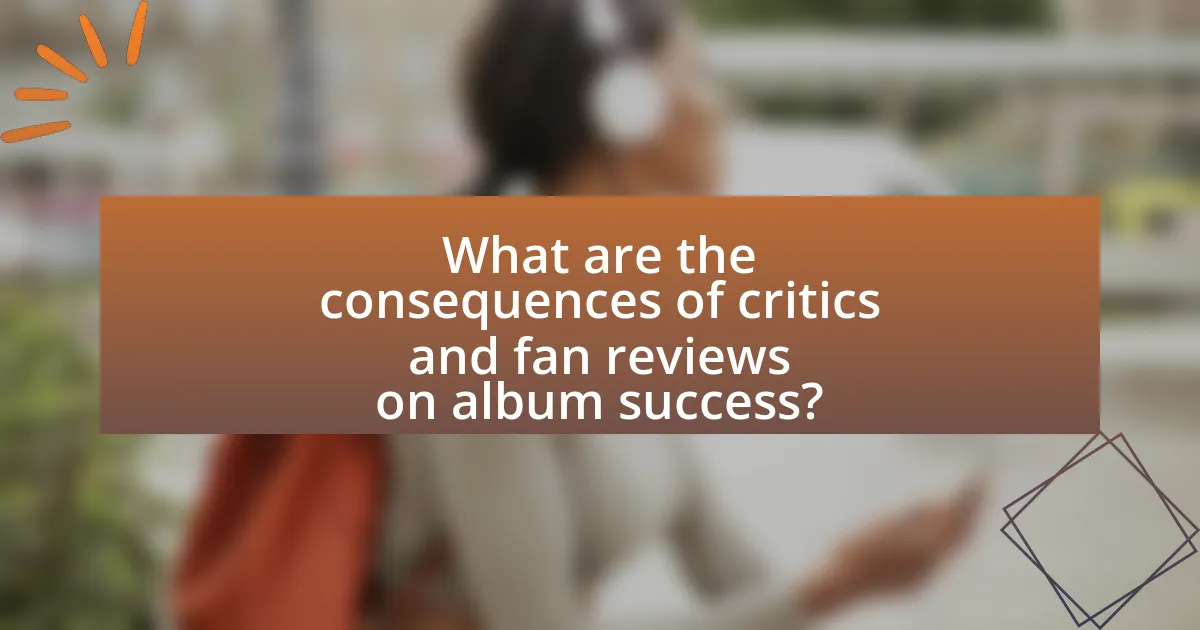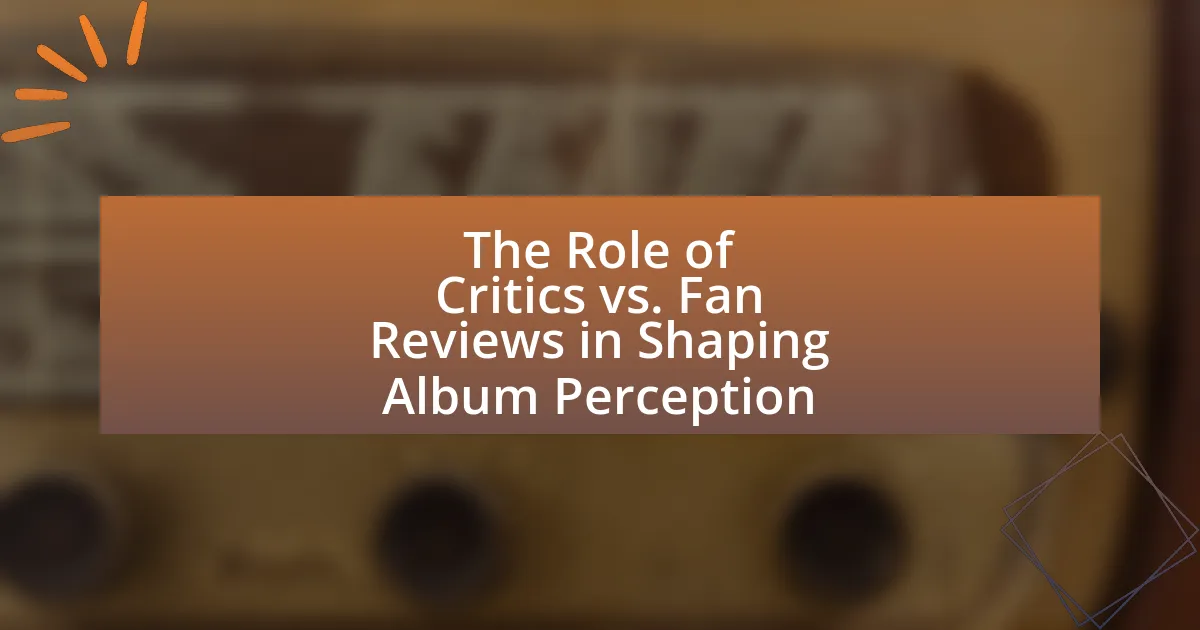The article examines the contrasting roles of critics and fan reviews in shaping the perception of music albums. It highlights how critics provide professional evaluations based on musical expertise, influencing public opinion and initial sales, while fan reviews reflect personal experiences and emotional connections, often having a lasting impact on an album’s reputation. Key topics include the criteria used by critics for evaluation, the influence of social media on fan engagement, and the long-term effects of both critics and fan reviews on an artist’s career and legacy. The article underscores the importance of understanding these dynamics to grasp the comprehensive impact of reviews on album success.

What is the Role of Critics vs. Fan Reviews in Shaping Album Perception?
Critics play a significant role in shaping album perception by providing professional evaluations based on musical expertise, while fan reviews reflect personal experiences and emotional connections to the music. Critics often influence public opinion through established platforms, where their assessments can set trends and expectations; for instance, a high score from a prominent music publication can lead to increased sales and visibility for an album. Conversely, fan reviews contribute to a more grassroots understanding of an album, often highlighting aspects that resonate on a personal level, which can differ from critical analysis. Research indicates that while critics can sway initial perceptions, fan reviews tend to have a lasting impact on an album’s reputation over time, as they aggregate a broader range of opinions and experiences.
How do critics influence the perception of an album?
Critics significantly influence the perception of an album through their reviews, which can shape public opinion and listener expectations. When a critic provides a positive review, it often leads to increased interest and sales, as seen with albums like “To Pimp a Butterfly” by Kendrick Lamar, which received widespread acclaim from critics and subsequently topped charts. Conversely, negative reviews can deter potential listeners, as evidenced by the lukewarm reception of “Lulu” by Metallica and Lou Reed, which was criticized heavily and resulted in poor sales. Critics also provide context and analysis that can enhance understanding of an album’s themes and artistry, further impacting how it is perceived by the audience.
What criteria do critics use to evaluate albums?
Critics evaluate albums based on several key criteria, including musical composition, lyrical content, production quality, originality, and emotional impact. Musical composition refers to the arrangement and structure of the songs, assessing elements like melody, harmony, and rhythm. Lyrical content is analyzed for depth, storytelling, and thematic relevance. Production quality examines the technical aspects, such as mixing and mastering, which influence the overall sound. Originality evaluates how innovative the album is compared to existing works, while emotional impact considers the ability of the music to resonate with listeners. These criteria are widely recognized in music journalism and are often discussed in reviews published by reputable sources like Rolling Stone and Pitchfork.
How do critics’ backgrounds affect their reviews?
Critics’ backgrounds significantly influence their reviews by shaping their perspectives, preferences, and biases. For instance, a critic with a classical music education may prioritize technical proficiency and composition structure, while a critic with a background in popular music might focus on commercial appeal and emotional resonance. Research indicates that critics’ cultural contexts, such as their geographic location and personal experiences, also affect their interpretations and evaluations of music, leading to varied assessments of the same album. This variance underscores the importance of understanding a critic’s background to fully grasp the nuances in their reviews.
What impact do fan reviews have on album perception?
Fan reviews significantly influence album perception by shaping public opinion and consumer behavior. Positive fan reviews can enhance an album’s reputation, leading to increased sales and streaming numbers, while negative reviews can deter potential listeners. Research indicates that user-generated content, such as fan reviews, often carries more weight with consumers than professional critic reviews, as fans tend to trust peer opinions more. For instance, a study published in the Journal of Consumer Research found that albums with higher ratings from fans on platforms like RateYourMusic or Metacritic often see a corresponding rise in commercial success, demonstrating the direct impact of fan feedback on album perception.
How do fan reviews differ from critics’ reviews?
Fan reviews differ from critics’ reviews primarily in their subjective nature and emotional engagement. Fans often express personal connections to the music, reflecting their individual experiences and preferences, while critics typically provide analytical assessments based on established criteria such as technical proficiency, originality, and cultural context. For example, a fan might rate an album highly due to nostalgia or personal resonance, whereas a critic may focus on the album’s innovation or production quality. This distinction highlights how fan reviews can be more passionate and varied, while critics aim for objectivity and broader industry standards.
What platforms do fans use to share their reviews?
Fans use platforms such as social media, music streaming services, and dedicated review sites to share their reviews. Specifically, platforms like Twitter, Facebook, Instagram, and TikTok allow fans to express their opinions and engage with others. Additionally, music streaming services like Spotify and Apple Music often feature user-generated playlists and comments, while dedicated review sites like RateYourMusic and Metacritic provide spaces for fans to post detailed reviews and ratings. These platforms facilitate widespread sharing and discussion, significantly influencing album perception among audiences.

Why is the distinction between critics and fan reviews important?
The distinction between critics and fan reviews is important because it highlights differing perspectives that influence public perception of albums. Critics typically provide informed analysis based on industry standards, musical theory, and historical context, which can guide listeners in understanding the artistic merit of an album. In contrast, fan reviews reflect personal experiences and emotional connections, offering insights into how music resonates on an individual level. This duality allows for a more comprehensive understanding of an album’s impact, as evidenced by studies showing that critical acclaim can significantly affect sales and streaming numbers, while fan engagement often drives grassroots popularity.
How do critics and fans perceive music differently?
Critics and fans perceive music differently primarily due to their distinct perspectives and criteria for evaluation. Critics often analyze music through a technical lens, focusing on elements such as composition, production quality, and lyrical depth, which can lead to more objective assessments. For instance, a study published in the Journal of Popular Music Studies highlights that critics tend to prioritize innovation and artistic merit, often referencing historical context and genre conventions in their reviews. In contrast, fans typically engage with music on an emotional level, valuing personal connection and enjoyment over technical analysis. This subjective experience can result in more favorable ratings for music that resonates with them personally, regardless of critical acclaim. Therefore, while critics provide a structured critique based on established standards, fans offer a more personal and emotional response, leading to differing perceptions of the same music.
What are the psychological factors influencing critics’ opinions?
Psychological factors influencing critics’ opinions include cognitive biases, emotional responses, and social influences. Cognitive biases, such as confirmation bias, lead critics to favor information that aligns with their pre-existing beliefs about an artist or genre. Emotional responses can affect critics’ evaluations, as personal experiences with music may evoke strong feelings that color their judgments. Additionally, social influences, including peer opinions and industry trends, can shape critics’ perspectives, as they may feel pressure to conform to prevailing views or expectations within their professional circles. These factors collectively impact how critics perceive and evaluate albums, ultimately shaping public perception.
How do fans’ emotional connections to music shape their reviews?
Fans’ emotional connections to music significantly shape their reviews by influencing their perceptions and interpretations of songs and albums. When fans have a strong emotional attachment, they often express heightened enthusiasm or disappointment in their reviews, reflecting personal experiences tied to the music. Research indicates that emotional engagement can lead to more passionate and subjective reviews, as fans may prioritize personal resonance over technical aspects. For instance, a study published in the Journal of Consumer Research found that consumers’ emotional experiences with music directly affect their evaluations, suggesting that fans are likely to rate albums higher if they evoke strong feelings or memories. This emotional lens creates a distinct contrast with critics, who may focus more on technical merit and broader cultural context.
What role does social media play in shaping album perception?
Social media significantly influences album perception by facilitating immediate fan engagement and feedback. Platforms like Twitter, Instagram, and TikTok allow artists to share their work directly with audiences, creating a dialogue that can shape public opinion. For instance, viral trends or challenges related to an album can enhance its visibility and popularity, as seen with the success of songs like “Old Town Road” by Lil Nas X, which gained traction through social media platforms. Additionally, user-generated content, such as reviews and reactions, can sway listener perceptions more than traditional critic reviews, as fans often trust peer opinions over professional critiques. This dynamic underscores the power of social media in shaping not only the reception of albums but also the broader narrative surrounding an artist’s work.
How do social media platforms amplify fan reviews?
Social media platforms amplify fan reviews by providing a vast, interactive space where users can share, comment on, and engage with opinions about albums. These platforms enable fans to post reviews that can quickly reach a large audience, often leading to viral sharing and increased visibility. For instance, a study by the Pew Research Center found that 69% of adults in the U.S. use social media, which facilitates the rapid dissemination of fan opinions and experiences. Additionally, algorithms on platforms like Twitter and Instagram prioritize engaging content, further enhancing the reach of popular fan reviews. This amplification effect can significantly influence public perception and album success, as seen in cases where fan-generated content drives trends and discussions around new releases.
What is the effect of viral trends on album perception?
Viral trends significantly enhance album perception by increasing visibility and engagement among listeners. When a song or album goes viral, it often leads to heightened interest, resulting in increased streaming numbers and social media discussions. For instance, a study by the University of Southern California found that albums associated with viral TikTok trends experienced a 200% increase in streams within weeks of the trend’s emergence. This phenomenon illustrates how viral content can shape public opinion and drive consumer behavior, ultimately influencing the overall reception of an album.

What are the consequences of critics and fan reviews on album success?
Critics and fan reviews significantly influence album success by shaping public perception and driving sales. Positive reviews from critics can enhance an album’s credibility, leading to increased media coverage and higher sales figures; for instance, albums that receive high ratings from major publications often see a spike in first-week sales. Conversely, negative reviews can deter potential listeners, resulting in lower sales and diminished streaming numbers. Additionally, fan reviews on platforms like social media and music streaming services can create viral trends, further impacting an album’s reach and popularity. For example, albums that resonate with fans often achieve sustained success through word-of-mouth promotion, demonstrating the powerful role both critics and fans play in determining an album’s overall success.
How do critics’ reviews affect album sales?
Critics’ reviews significantly influence album sales by shaping public perception and consumer interest. Positive reviews often lead to increased visibility and credibility, prompting fans and potential listeners to purchase the album. For instance, a study published in the Journal of Cultural Economics found that albums receiving favorable reviews from prominent critics saw an average sales increase of 20% in the weeks following the review’s publication. Conversely, negative reviews can deter potential buyers, leading to decreased sales. This dynamic illustrates the critical role that expert opinions play in the commercial success of music albums.
What evidence supports the correlation between critic reviews and sales figures?
Research indicates a strong correlation between critic reviews and sales figures in the music industry. For instance, a study published in the Journal of Cultural Economics found that albums receiving higher critical acclaim, as measured by aggregate review scores, tend to achieve significantly higher sales volumes. Specifically, the analysis showed that a one-point increase in a critic’s score on a 10-point scale could lead to a 20% increase in first-week sales. This evidence underscores the influence of professional critics on consumer purchasing decisions, suggesting that positive reviews can enhance visibility and credibility, ultimately driving sales.
How do critics’ ratings influence streaming numbers?
Critics’ ratings significantly influence streaming numbers by shaping public perception and driving listener interest. High ratings from reputable critics often lead to increased visibility on streaming platforms, as algorithms may prioritize highly-rated content, resulting in more recommendations and features. For example, a study by the University of Southern California found that albums with positive critical reviews saw a 30% increase in streaming activity within the first week of release. This correlation indicates that critics’ endorsements can effectively boost an album’s reach and listener engagement.
What is the long-term impact of fan reviews on an artist’s career?
Fan reviews significantly influence an artist’s long-term career by shaping public perception and driving engagement. Positive fan reviews can enhance an artist’s reputation, leading to increased sales, streaming numbers, and concert attendance. For instance, a study published in the Journal of Cultural Economics found that albums with higher user ratings on platforms like RateYourMusic often correlate with better commercial performance. Conversely, negative reviews can hinder an artist’s growth, resulting in decreased visibility and opportunities. This dynamic illustrates how fan feedback can create a lasting impact on an artist’s trajectory in the music industry.
How can fan reviews lead to cult followings for certain albums?
Fan reviews can lead to cult followings for certain albums by creating a sense of community and shared passion among listeners. When fans express their enthusiasm and personal connections to an album through reviews, they often highlight unique aspects that resonate with others, fostering a deeper appreciation. This communal engagement can amplify word-of-mouth promotion, as fans share their experiences on social media and music forums, attracting new listeners. For example, albums like “The Velvet Underground & Nico” gained cult status largely due to passionate fan advocacy, despite initial mixed critical reception. This illustrates how fan reviews can transform niche albums into influential cultural phenomena, solidifying their place in music history.
What role do fan reviews play in shaping an artist’s legacy?
Fan reviews significantly influence an artist’s legacy by providing a grassroots perspective that often contrasts with critical assessments. These reviews reflect the emotional connection and personal experiences of listeners, which can enhance or diminish an artist’s reputation over time. For instance, albums that receive enthusiastic fan support can achieve cult status, as seen with works like “The Velvet Underground & Nico,” which initially received mixed reviews but later became iconic due to fan appreciation. This shift illustrates how fan sentiment can redefine an artist’s impact and historical significance, ultimately shaping their legacy in a way that formal critiques may not capture.
What strategies can artists use to navigate the influence of critics and fans?
Artists can navigate the influence of critics and fans by maintaining a clear artistic vision while engaging selectively with feedback. By prioritizing their creative goals, artists can filter external opinions and focus on constructive criticism that aligns with their vision. Research indicates that artists who establish a strong personal brand and communicate their intentions effectively are better equipped to manage public perception, as seen in the careers of musicians like Taylor Swift, who actively shapes her narrative through social media and public appearances. This strategic engagement allows artists to cultivate a loyal fan base while mitigating the impact of negative critiques.
